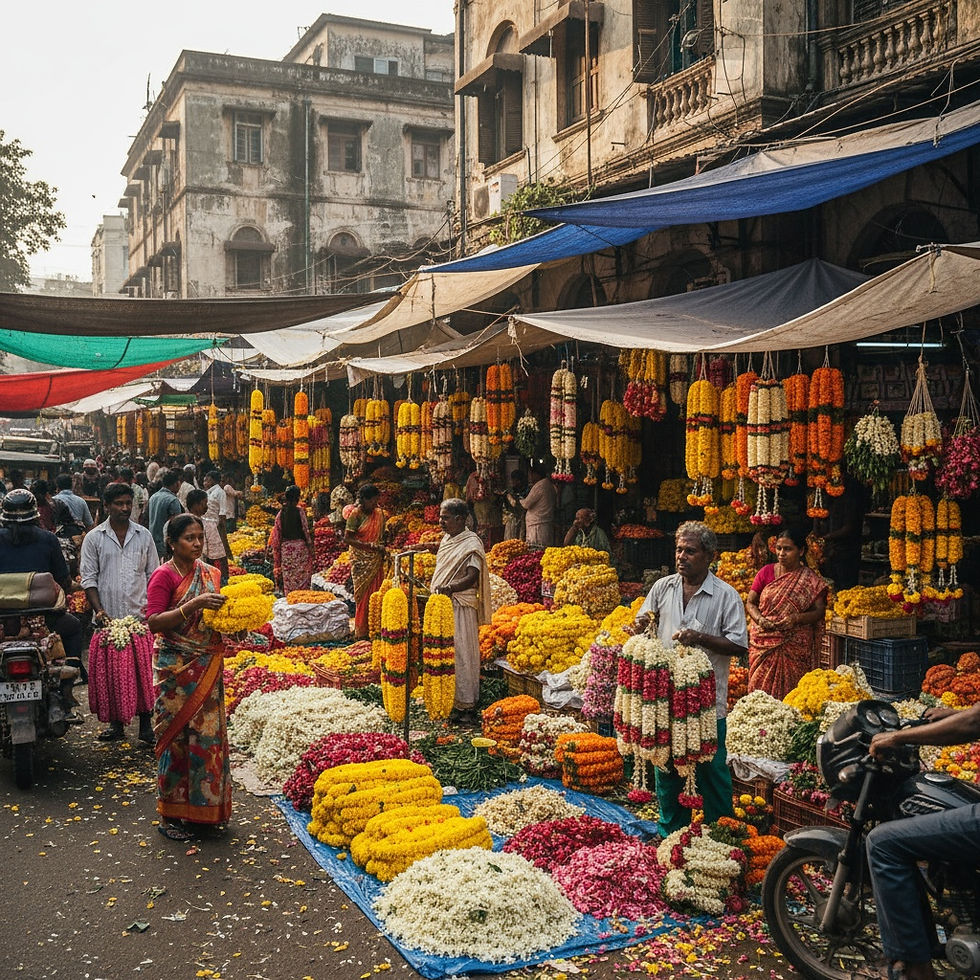When The Mumbai Rains Spoke Urdu
- Rajesh Seshadri
- Nov 8, 2025
- 4 min read
It had started as a drizzle. The kind that tap-dances on tin roofs and windshields, romantic in movies but annoying when you’re stuck in a rickshaw between Andheri and Bandra at 6:45 PM. Within minutes, it had grown into a downpour — horizontal sheets of rain whipping the city sideways. And within the hour, it was a flood. Mumbai, resilient as ever, was brought to its knees. Again.
[If you like this story, please feel free to share it with not just every Mumbaikar, but with everyone who loves short stories. Make their day]
Wahid Bhai, Auto No. MH 02 BY 6487
Wahid Khan was not one for drama. At 53, he had been driving his auto for nearly thirty years, mostly in Bandra, Juhu, Andheri—“Mumbai ke dil wale ilaake,” as he called them. A man of wiry frame, soft eyes, and a beard that had turned peppery with the years, Wahid wore his white kurta-pajama with pride and his skullcap with quiet devotion. He was known to be honest — the sort who would return a forgotten wallet, even if it had twenty crisp pink notes inside.
Every evening at 5, he would stop near Lucky Restaurant for a glass of strong Irani chai. He always nodded a polite Salaam to the boys selling bootleg watches and the woman peddling jasmine gajras.
But today, chai was forgotten. By 6:15 PM, the sky had turned an ominous charcoal. The radio in his auto crackled with warnings. “Heavy rainfall alert... waterlogging in low-lying areas... local train services suspended...”
Still, he hadn’t expected the chaos.
Smriti Deshmukh, 34, consultant by day, cynic by lifestyle, was running late from her client’s office in Marol. Her Wadala flat was a solid hour away, even without the traffic. But Uber was surging, the cabs were vanishing, and her expensive block-printed FabIndia kurta was already spotted with rain. Just as she turned around to go back inside the glass façade of the office building, she saw an auto rickshaw under a gulmohar tree. Vacant. Dry. Waiting.
“Wadala East chaloge?” she asked, breathlessly.
Wahid Bhai tilted his head. “Baarish zyada hai, madam. Raasta flooded hoga.”
“Main double meter doongi,” she said.
He frowned. “Meter ka nahi, jaan ka sawaal hai.”
She was about to walk away when he added, “Baith jao. Dekhte hain.”
That ‘Dekhte hain’ — part fatalism, part chivalry — would change the night for both of them.
Fifteen minutes in, they were crawling through ankle-deep water. Twenty minutes later, it was thigh-high, and the auto had stalled. The streetlights flickered and died. Water lapped against their feet. A BMW honked somewhere nearby and promptly choked. They were not going anywhere.
“Bas yahin raat bitani padegi,” Wahid said, pulling the tarpaulin sheet tighter.
Smriti groaned. “Brilliant. First, a cancelled date. Then the apocalypse. Now I am sharing an auto with a man who thinks FabIndia is a planet.”
Wahid chuckled. “FabIndia toh nahi pata. Lekin aapki khushboo achhi hai. Sandalwood?”
Smriti blinked. Then laughed. “Yeh baat toh kisi ne nahi boli kabhi. Thanks.”
They sat in silence for a few minutes, the only sound the hiss of rain and the occasional splash of a floating plastic bottle.
“Woh kya padh rahe the aap? Office ke bahar... kuch Urdu jaisa lag raha tha.”
Smriti smiled. “Faiz Ahmed Faiz. Shayari. Helps me stay sane in client meetings.”
Wahid’s eyes lit up. “Faiz? Kya baat hai. ‘Bol ke lab azaad hain tere...’”
She joined in: “‘Bol zubaan ab tak teri hai...’”
The rain applauded silently outside.
Over the next few hours, they conversed.
About his son Faheem who wanted to be a pilot but settled for being a delivery agent. About her childhood in Nashik, where the sky was bigger, and expectations were smaller. About how she broke an engagement with a Brahmin boy who found her ‘too loud on social media’.
“Main toh shaant hoon, actually,” she said. “Bas, main chup rehne waalon mein se nahi hoon.”
Wahid nodded. “Achhi baat hai. Chup rehne waale ya toh thak jaate hain, ya maar diye jaate hain.”
They shared Parle-G biscuits she found in her tote bag. He found a flask of lukewarm chai from under the driver’s seat. Together, they made a midnight picnic.
At some point past 1 AM, she asked, “Aapki biwi?”
“Guzar gayi,” he said softly. “Cancer. Chhoti si thi, par badi himmat wali.”
Smriti’s hand reached out and touched his arm gently. He did not flinch.
“Main bhi thodi himmat wali hoon,” she said.
“Pata chal gaya,” he smiled.
At 5:30 AM, the rains slowed. A municipal truck passed, clearing branches. People stirred. Tea stalls opened like poppies in sun.
Wahid turned to her. “Chaliye, chhod deta hoon. Wadala?”
“Nahin. Kahin aur chalo. Juhu,” she said. “Walk karne ka mann hai.”
They drove in silence until the sea appeared. Grey and sullen, but vast and alive.
Before she stepped out, she turned. “Thank you, Wahid Bhai. For the chai. And Faiz.”
“Aur aapka sandalwood,” he replied.
They laughed.
She walked towards the water, her FabIndia kurta clinging to her knees, hair wild, eyes bright. He watched for a moment, then turned the key in the ignition.
Later that day, she tweeted a thread titled “When the Rains Spoke Urdu”. It went viral.
#AutoWahid trended for a day. She was invited to an event panel on “City Conversations.” Wahid got a new rainproof auto cover, gifted by a reader in Pune.
They never met again.
But sometimes, at Lucky Restaurant, a few poets gather under the fan, reciting Faiz over chai. And every monsoon, Smriti lights a sandalwood-scented candle in her apartment.
For a stranger who made a stormy night feel like a poem.
To read more such stories, visit https://amzn.to/3UNwYFH









Comments